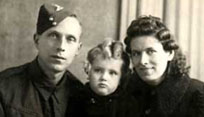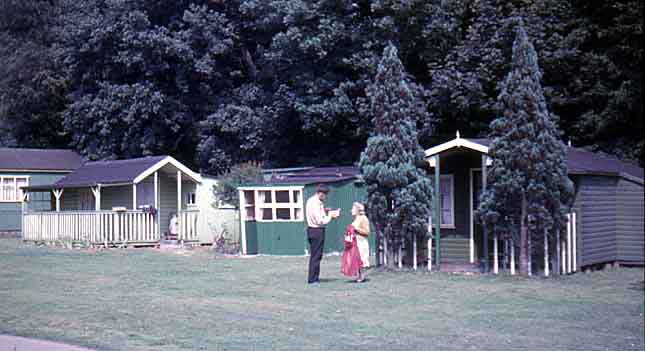|
CHILDHOOD 1941-1952
These two incidents are not typical of my time in Victoria School, which was a traditional learning experience in large classes (there were 52 in my last class, taught by Mrs Smeathers). When equal marks were obtained on a test, we were simply placed in alphabetical order, so, being towards the end of the alphabet, I was often way down the class list. I remember my mother complaining when I came 17th in the class in spelling, despite getting 20 out of 20. Two of the boys my age were advanced by a year, Ian Richardson and Michael Beswick and went to the Grammar School a year before me. Two boys a year younger than me were advanced to my year: Tim Robinson and David Berry. There were two scholarships for the local public school, Wellingborough School. I was short-listed, but the places went to Tim Robinson and David Berry. I was good but, apparently, not that good. At that time, the Grammar School had a far better academic and sporting reputation, and this proved to be the making of me. Apart from my school life in those early years, I had a carefree childhood. We lived in a small 2 up, 2 down terraced house at 45 Cannon St with a toilet at the bottom of the garden and a water tap outside the back door. Dad grew potatoes in the back garden and despite the deprivation following the war, we never wanted for anything. Every Saturday morning I went to ‘Saturday morning Pictures’ at the Lyric Cinema, usually with my brother, Graham. As we grew older, we were sometimes accompanied by our ‘skin and blister’ (sister), Rosemary. On Saturday evenings the whole family went to the Working Men’s Club in Cannon St, where a small band played for Old Tyme Dancing. This involved two misconceptions that dogged me through many years of my life. First my memories of the music of Strauss were based on a crude version of the ‘Blue Danube’ played badly by a trio of clarinet, piano and drums. I developed a contempt for the music of Strauss in general, and the Blue Danube in particular. Second was a memory of whisky as drunk by Bob Martin, my step-grandfather, that reminded me of the horrible smell of urine in the gent’s toilets. Not an auspicious start to a life that eventually embraced the operettas and waltzes of the Strauss Family and the pleasures of single malt. I was fortunate beyond measure in my childhood to have a mother who organized our finances well. My father gave her his wage packet every Friday and she planned the overall expenditure, including our holiday chalet at Overstone Solarium, six miles away in the country, and an annual holiday to Butlin’s, at places such as Clacton, Skegness, Filey and Pwllheli. No-one can have had a better childhood. I had opportunities to enjoy the natural world, to have glorious holidays with a caring family and to learn to work hard to achieve important objectives. My mother also had ambition for her offspring. From an early age she was sure I would go to Oxford and study to be a doctor. She told me that in a conversation with Dr Watson, our family G.P. (general practitioner). I was about five years old and said to him, “When I grow up, I don’t want to be a gentleman, I want to be a doctor, like you.” It was an an ambition that would later be thwarted...
Those days as a child at Overstone in the fifties were halcyon days. My mother’s chalet (on the left of the picture) was extended in the early forties to add a bedroom for five, a kitchen with calor gas, and a verandah around the front. We played in the woods behind the chalet by day, a range of kiddies games in the field in front including various forms of cricket, we swam daily in the Overstone Swimming Pool and wandered round the two lakes where fish were caught in plenty by the anglers. At night we played cards by the light of an oil-lamp. Links with the outside world came from a portable radio, listening to Educating Archie, Ray's a Laugh, The Lyons Family, and many other light comedies that filled wet Sunday afternoons. We also had a wind-up gramophone, with our favourite record being “The Last Roundup”. Our Nan had a simple little voice and she often sang to us. My favourite was the Irish music-hall song “Galway Bay”. I remember the hours it seemed to take cutting the grass round the chalets and the chore of scraping the potatoes for the mountain of chips we had with sausages and beans for lunch. The best part was ... the family. We had such fun together. One year we would build a tree-house in the tree behind Uncle Bill’s chalet, another we would spend the summer digging a den in a deep hole underground. I cannot believe that children today with the dominance of computer games, TV cartoons and other artificialities of modern life can have half the fun that we had from the simple togetherness of family life. The story continues here ... |
top of page
PERSONAL HOME PAGE | Family | Life | Photos | Music | Whisky | Links | ACADEMIC HOME PAGE


